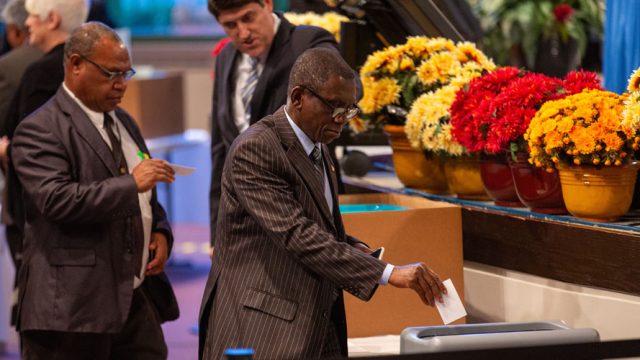We never have to doubt our salvation.

On an ash-gray afternoon in Jerusalem darkness already engulfed the Place of the Skull. Hanging from bloodstained crosses, two thieves were in their death throes. Between them a third cross had been erected, where Jesus, the Redeemer of the world, was giving His life for humanity. That God-man had lived surrounded by sinners, calling them to repentance. But now He suffered between the two of them, fulfilling His mission “to seek and to save that which was lost” (Luke 19:10).
Suddenly, one of the criminals addressed Him sarcastically: “If You are the Christ, save Yourself and us” (Luke 23:39). Poor man! He had lived his life in the misery of sin and hardened his heart to the biddings of God’s Spirit. He had lost any hope of escape. Dark heralds of death were already covering him with their somber mantle. In that moment he allowed the malignant virus of doubt to eat away his life.
The other thief, who had also walked wickedly, knew he deserved to die as a result of his ignominious past. When he heard his fellow thief’s taunt, he lifted his dying eyes to meet Jesus’ loving gaze. This hapless sinner had nowhere to go. He also was at the end of his journey of lawlessness. But when he saw Jesus, he remembered words Jesus had once spoken: “I am the way, the truth, and the life” (John 14:6).
This thief recognized he needed a way out of his world of shadows and death. He lacked truth, because his life had been an incessant display of lies. He needed life, because his existence had been wasted in the quicksand of sin. So he clung to the only ray of hope he had before him. He stammered: “Lord, remember me when You come into Your kingdom” (Luke 23:42).
What good had the thief done to prompt Jesus to remember him? The thief had drunk from filthy waters. He carried the stench of sin. What reason did that wretched evildoer have to believe that Jesus would remember him? He believed, however, and pled his case. The thief had hardly finished speaking when he heard Jesus’ strongly worded promise: “You will be with Me in Paradise” (verse 43).
Soon the thief’s heartbeat stopped. But he died wrapped in the assurance of salvation in Christ.
SALVATION IS JUST THE BEGINNING
That assurance was not born of the thief’s good deeds; he had done nothing good. His assurance was born in the words of the One who is able to drive us to good works. The repentant thief, now saved in Christ, had no opportunity to perform good works, but at the cross he received two blessings: salvation and death in Christ.
When we accept Jesus as our Saviour, we receive not only the blessing of salvation. We live to become channels of good works that the Holy Spirit produces in the lives of those who have been saved.
Many believers use the expression “I am saved” reluctantly. Such reluctance is born of two faulty assumptions about grace: First, “Jesus saves me, so I shouldn’t worry about my deeds”; and second, “Once saved, I’m now saved forever.” Even as we reject incorrect notions about salvation, that doesn’t mean that we should live in constant uncertainty about our salvation in Christ.
Paul was convinced that “He who has begun a good work in you will complete it until the day of Jesus Christ” (Phil. 1:6). Salvation starts in Christ (justification); it is lived in Christ (sanctification); and it finds its completion in Him (glorification).
Romans 5 explains in a wonderful way the topic of the assurance we have in Christ’s salvation. The apostle Paul begins by saying, “Therefore, having been justified by faith, we have peace with God through our Lord Jesus Christ” (verse 1). Peace results from the assurance that salvation is “through our Lord Jesus Christ.” He finishes by saying, “So that as sin reigned in death, even so grace might reign through righteousness to eternal life through Jesus Christ our Lord” (verse 21).
Sin used to reign, but not anymore. Now grace reigns in Christ. And that’s that. Our assurance of salvation is found in the phrase “through Jesus Christ,” which is found in both the first and last verses in Romans 5. It implies constant communion with our source of righteousness, Jesus Christ. If we are in Him, we are made the “righteousness of God” (2 Cor. 5:21). We don’t have to fear our past, our present, or our future. Our assurance is not based in our ability of being good, but in Christ, who is the source of everything that is good.
Ellen White wrote, “There are those who have known the pardoning love of Christ and who really desire to be children of God, yet they realize that their character is imperfect, their life faulty, and they are ready to doubt whether their hearts have been renewed by the Holy Spirit. To such I would say, Do not draw back in despair. We shall often have to bow down and weep at the feet of Jesus because of our shortcomings and mistakes, but we are not to be discouraged. Even if we are overcome by the enemy, we are not cast off, not forsaken and rejected of God. No; Christ is at the right hand of God, who also maketh intercession for us. . . . He desires to restore you to Himself, to see His own purity and holiness reflected in you. And if you will but yield yourself to Him, He that hath begun a good work in you will carry it forward to the day of Jesus Christ.”¹
Thus, “when Satan comes to tell you that you are a great sinner, look up to your Redeemer and talk of His merits. That which will help you is to look to His light. Acknowledge your sin, but tell the enemy that ‘Christ Jesus came into the world to save sinners’ . . . (1 Tim. 1:15).”²
¹ Ellen G. White, Steps to Christ (Mountain View, Calif.: Pacific Press Pub. Assn., 1956). p. 64.
² Ibid., pp. 35, 36.









